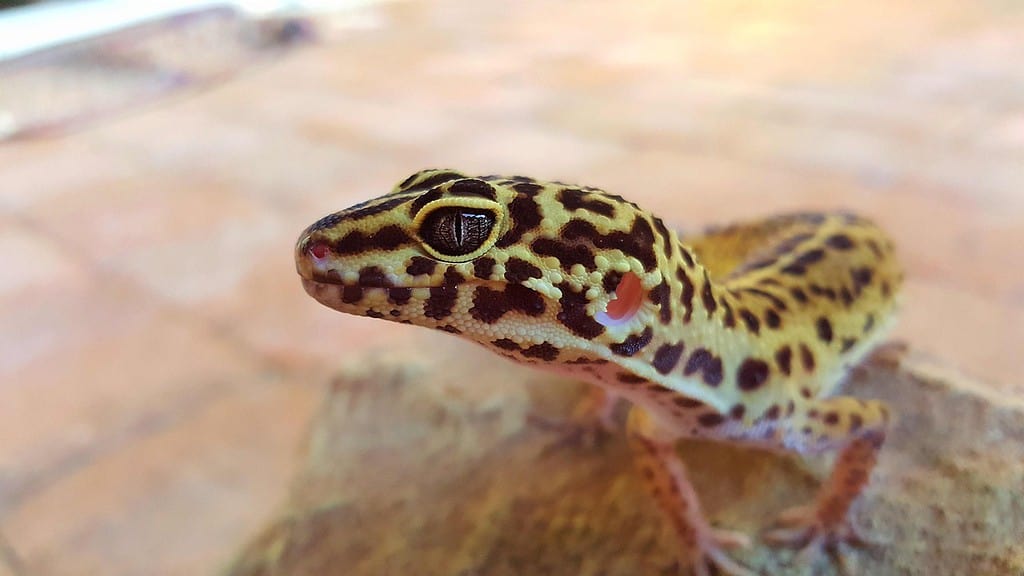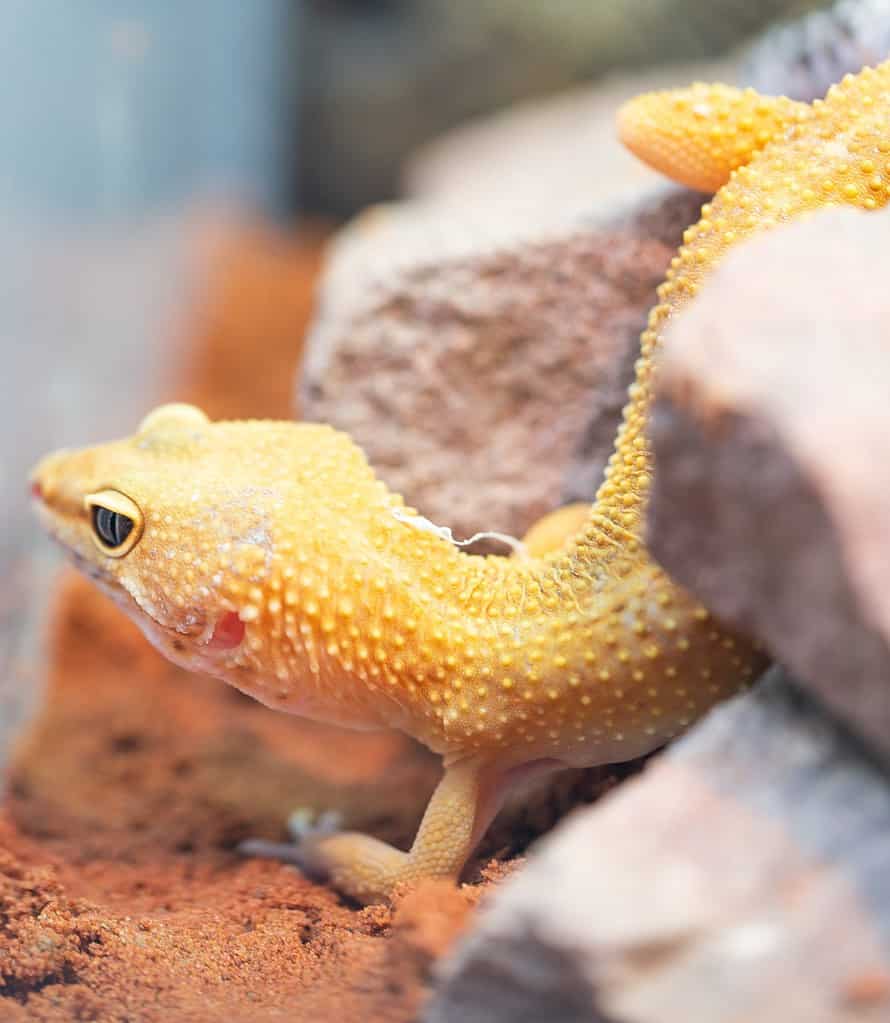Leopard geckos are some of the most popular reptiles kept as pets. They’re relatively low-maintenance, can be handleable, and make for interesting pets to watch. But one question always seems to come up when it comes to leopard geckos: do they have teeth? The answer is a bit more complicated than a simple yes or no. Keep reading to learn more about leopard gecko teeth and what they can tell us about these unique creatures.

Leopard geckos have rows of small, sharp teeth that they use to grip their prey. Each tooth is attached to a very strong jaw, which allows the gecko to crush its food. An adult leopard gecko has about 100 teeth, which are replaced periodically throughout its life.
Leo’s Teeth Structure
The growth of teeth in leopard geckos often begins at a young age and continues uninterrupted until the gecko passes away. Even before it has hatched, this gecko has already begun to build its teeth.
Geckos’ teeth originate from cells in their ectoderm layer. These cells have developed the ability to thicken and expand inward, which ultimately results in the formation of the dental lamina. After that, the dental lamina will join the teeth of the gecko to the epithelium that lines the oral cavity.
As is the case with the vast majority of geckos, Leos have rows of tiny teeth in the shape of cones that border the dentary bone (found in the lower jaw) and the upper jaw bones. Geckos often have a greater number of teeth on their upper jaws as compared to their lower jaws. It is difficult to ascertain the precise quantity of teeth present because teeth frequently fall out and are also replaced.
The total number of teeth in a healthy leopard gecko should range anywhere from 50 to 100 on average (sometimes as maximum as 300).
What Would Urge a Leopard Gecko to Bite?
When a Leo feels threatened by a person, it will almost always attempt to protect itself by biting the person who is causing it harm. It is essential that you treat Leo with kindness and avoid doing anything that would make him angry so that you can avoid getting bitten. If you are not cautious, they will bite you.
Their bites are considered to be hardly painful, and they do not even puncture the skin. Even while this shouldn’t be a major cause of concern for you, it is essential to be certain that you are providing the appropriate level of care for your Leos and ensuring they are both comfortable and secure at all times. Let’s go over some of the reasons why leopard geckos could try to bite you, as well as some of the ways you might prevent getting bitten.
- To begin, Leopard Geckos are pretty possessive of their territory. This not only indicates that they value their privacy but it also indicates that they are sensitive to the odor of other geckos and feel threatened by it. This is especially true for male Leos, especially at the time of year when they are trying to mate.
- They will have a justification for biting you if they detect the odor of another male Leo on your hands. In order to prevent this from happening, you need to make sure that you clean your hands after handling multiple geckos. Therefore, before you grasp another, you should ensure that your hands are clean so they don’t confuse you with something else.
- You also run the risk of being misidentified as food by hungry Leopard Geckos. They could try to take a bite off of your finger if they have to move around you immediately before feeding time if you chance to be in the way. Make sure that your reptiles are fed before you pick them up so that you may avoid this problem. If this is not an option, you should provide some kind of diversion for him to focus on so that he does not confuse his finger with food.
- Leos can also have quite different personalities, and you could have to cope with some that are really hostile. They may be hostile against you during the first few days or the first week you are in a new location, but after that period, they should start to get acclimated to you and calm down. If this does not occur, it is possible that they are just more anxious than other geckos or that they have underlying issues that cause them to be more aggressive.
Do Juvenile/Baby Leos Bite?
As with adults, there are one hundred teeth on the jaws of baby leopard geckos. Additionally, juvenile geckos are more likely to bite than their adult counterparts. If you have juvenile Leopard Geckos, you run a significantly greater risk of being bitten by one of them. Most of the time, this would be due to an interest in new experiences, fun, and learning, but it still happens. Their bites are so small that they do not inflict any excruciating pain. (Here’s how you properly handle a Leopard Gecko)
It’s possible they are merely upset, terrified, or scared, but this seems to be the most typical explanation. They may be provoked into biting you if you grasp them too quickly or make a lot of loud noises. This may cause them to feel the need to defend themselves.
It is best to wait until the gecko has adjusted to its other life conditions, such as a new environment or the fact that it is already a baby gecko, before attempting to get it to acclimatize to you. This also implies that it is essential to domesticate your gecko so that it may develop acclimated to you and the other people who are frequently in its environment. Even though geckos often flee when they are frightened, there is always the possibility that they will attempt to bite you.

What You Should Do If You Get Bitten By A Leopard Gecko?
Geckos are carnivorous animals, and they hunt using their teeth. In contrast to humans, however, they do not chew their food but rather swallow it whole. They propel the insects down their throats using a combination of the power of their flexible tongue and the movement of their muscles. Their teeth are not in the correct alignment for them to be able to bite their food, but this makes it much simpler for them to swallow it. Their minute teeth are hardly likely to cause any pain to the skin of your fingers. The bite of a little gecko will not cause any pain, and even the bite of a normal-sized gecko will only cause minimal discomfort.
When working with geckos or the habitat in which they live, it is strongly advised that you wash your hands properly beforehand. If your pet bites you, it is essential to sterilize the affected region, which is required if the bite draws blood. In order to eliminate any bacteria from the bite, you will need to apply cleaning alcohol or H2O2 to the affected region. In order to get rid of the bacteria that are on your hands, you need to wash your hands using antiseptic soap. This process may cause you some discomfort; nonetheless, it is essential because it helps protect you from being sick by any germs or filth that may be present in your environment. Following this, you can apply a band-aid to the affected region.
It is a common misconception that getting bitten by an animal would inevitably result in one’s death, although this is not always the case. It is possible for this to occur with other animals, including dogs, but it is highly unusual to occur with leopard geckos. Therefore, all you need to do is wash the area where you were bitten and apply a band-aid. You can seek the reassurance and guidance of your veterinarian if you have any more questions.
